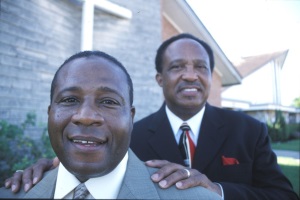Help mentees face the truth about the issues holding them captive.
The concept of accountability is as old as the Bible. Jesus, our “Master Mentor,” lived fully accountable to His Father throughout His ministry.
Ephesians 5:21 says, “Be subject to one another in the fear of Christ.” There are many examples of accountability in the Bible:
 King Saul was held accountable by the prophet Samuel.
King Saul was held accountable by the prophet Samuel.- King David was held accountable by the prophet Nathan.
- The apostles were accountable to Jesus.
- Timothy was accountable to the apostle Paul.
In our culture we have come to accept the concept of “minding one’s own business.” Accountability is a very sensitive area when working with prisoners and ex-prisoners. Most of them have lived their entire lives with the attitude: “I don’t need anyone telling me what to do or how to live.” Many have a problem with authority figures.
A Two-Way Street
In a mentoring relationship, accountability must be reciprocal. Mentors are called to keep mentees accountable, but they must also be accountable to their mentees. Being accountable means to be:
- Honest, truthful, genuine, having integrity (even if it hurts)
- Willing to submit my life to inspection in order to obtain spiritual growth
- Humble enough to ask another person for advice
- Open enough to give another person the freedom to observe and evaluate me
- Teachable and approachable, willing to learn
- Transparent, willing to be vulnerable and share my fears and weaknesses
- Available and accessible, willing to invest time needed for communication
The key to accountability is the quality of your relationship. If mentees truly believe you care, they will allow you to keep them accountable – because you have their best interest at heart. If you try to keep mentees accountable before you build a solid relationship, they may become defensive and resent you confronting them.
Wesley’s Accountability Questions
 Many Christian authors have come up with accountability questions to prompt honest self-examination and self-disclosure. Arguably, none of the lists is any better than that of John Wesley, the eighteenth-century founder of Methodism.
Many Christian authors have come up with accountability questions to prompt honest self-examination and self-disclosure. Arguably, none of the lists is any better than that of John Wesley, the eighteenth-century founder of Methodism.
Wesley led the “Holy Club” — a band of Oxford University students seriously dedicated to living lives of holiness and service to God and to others. Along with Bible study, fasting, and prayer, the participants were committed to bringing their lives under honest review.
Wesley’s self-examination questions still stand the test of time. We recommend using questions like these to foster accountability and growth:
- Am I honest in all my acts and words, or do I exaggerate?
- Do I carelessly pass on to another what was told to me in confidence?
- Can I be trusted? Am I reliable?
- Am I a slave to dress, friends, work, or habits?
- Am I self-conscious, self-pitying, or self-justifying?
- Do I give the Bible time to speak to me every day?
- Am I enjoying prayer? Is Christ real to me?
- When did I last speak to someone else about my faith?
- Do I disobey God in anything?
- Do I insist on doing something about which my conscience is uneasy?
- Am I defeated in any part of my life?
- Am I proud, jealous, impure, critical, irritable, touchy, or distrustful?
- Do I grumble or complain a lot?
- How do I spend my spare time?
- Is there anyone whom I fear, dislike, criticize, resent, or disregard? What am I doing about it?
Uncovering the Truth
More contemporary accountability lists include questions about sex. For example: Have I touched or looked at another person inappropriately? Have I viewed or read sexually explicit material?
And many authors recommend ending any list with the question: “Have I just lied to you about anything?”
We all have a tendency to want to hide our sins and mistakes. These accountability questions accentuate the need for truth. Jesus said, “The truth will set you free.” (John 8:32) Overcoming the issues that led to incarceration can only happen if mentees are willing to face the truth.
Teaching Accountability
Edited: Original article by Becky Beane, former PF writer/editor